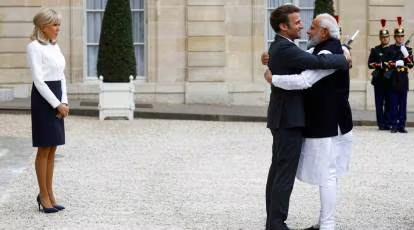CM summons state’s top officers to Janata Darshan to address public grievances
In a noteworthy development marking a new approach to direct public engagement, Uttar Pradesh Chief Minister Yogi Adityanath, for the first time in his eight-year tenure, convened his widely known ‘Janata Darshan’ programme at his official residence in Lucknow on Thursday, with an unprecedented move of having the state’s top bureaucratic and police leadership in attendance.
This significant step was aimed at ensuring that people’s grievances are addressed on the spot with swift and effective solutions, leaving no room for bureaucratic delays.
Present alongside the Chief Minister were several of the most senior administrative and police officers of Uttar Pradesh, including Chief Secretary Manoj Kumar Singh, Director General of Police (DGP) Prashant Kumar, Additional Chief Secretary to the Chief Minister S.P. Goel, Revenue Board Chairman Anil Kumar, Sanjay Prasad, Principal Secretary for Home and Information, and the Principal Secretary to the Chief Minister.
According to sources familiar with the proceedings, this gathering of high-ranking officials was not part of a pre-scheduled plan.
Early in the morning, around 8 am, the Chief Minister, noticing the need for immediate high-level attention, issued an impromptu directive to his staff to summon all the senior officers to his Lucknow residence by 8:30 am.
Responding promptly to the Chief Minister’s call, the entire top brass hurried to the venue and remained present by his side until the conclusion of the public hearing.
It is understood that the Chief Minister’s decision to involve the senior-most officers directly stemmed from a growing concern over the recurring presence of some complainants at his Janata Darshan sessions — both in Lucknow and Gorakhpur — bringing the same issues multiple times.
This pattern highlighted a gap in the system regarding timely and satisfactory resolution of public grievances, prompting Adityanath to take strong corrective measures.
Determined to address the matter at its root, the Chief Minister wanted his senior-most officers to experience firsthand the nature of the complaints and oversee the process of grievance resolution, especially in cases where citizens were being forced to return repeatedly for the same concerns.
He instructed the officers to review why these grievances were pending, identify bottlenecks, and ensure that the concerned departments take immediate action to close the matters in a time-bound manner.
During the interaction, the Chief Minister gave clear instructions to all heads of departments present to maintain a proactive approach and respond to grievances without unnecessary procedural delays.
The range of complaints raised during the Janata Darshan covered a wide spectrum of issues, including policing concerns, revenue disputes, requests for medical assistance, pension-related problems, and demands for infrastructure development — particularly road construction.
In a compassionate gesture, the Chief Minister also personally handed over smart walking sticks to two differently abled youths who had traveled from Chandauli district, highlighting his government’s focus on ensuring inclusivity and dignity for all sections of society.
While addressing the assembled officers, Adityanath laid out fresh instructions to strengthen the grievance redressal framework across the state.
He emphasized that district and divisional-level officers must ensure their presence in their offices by 10 am every working day without exception, so the public can access them easily and have their concerns addressed promptly.
The Chief Minister made it clear that local issues, especially those that fall within the jurisdiction and administrative capacity of district officials, must be resolved at the grassroots level itself. Only those grievances that are beyond the scope of local resolution should be escalated to the state government or higher authorities for further action.
Further, he instructed the Chief Secretary, the Additional Chief Secretary to the Chief Minister, and the Principal Secretary (Home) to issue explicit directions to divisional commissioners and district magistrates across the state.
Their responsibility, he stressed, is to ensure that complaints are addressed seriously and resolved efficiently, so citizens are spared the trouble of repeatedly bringing the same grievances to the Chief Minister’s office.
Reflecting on the initiative, DGP Prashant Kumar noted that the direct interaction between the public and top-level officials created a meaningful platform to understand issues firsthand and work towards delivering timely solutions.
The Chief Minister’s hands-on involvement and the strong message sent through the presence of the state’s administrative leadership signals a renewed commitment to responsive governance, accountability, and efficient public service delivery in Uttar Pradesh.




